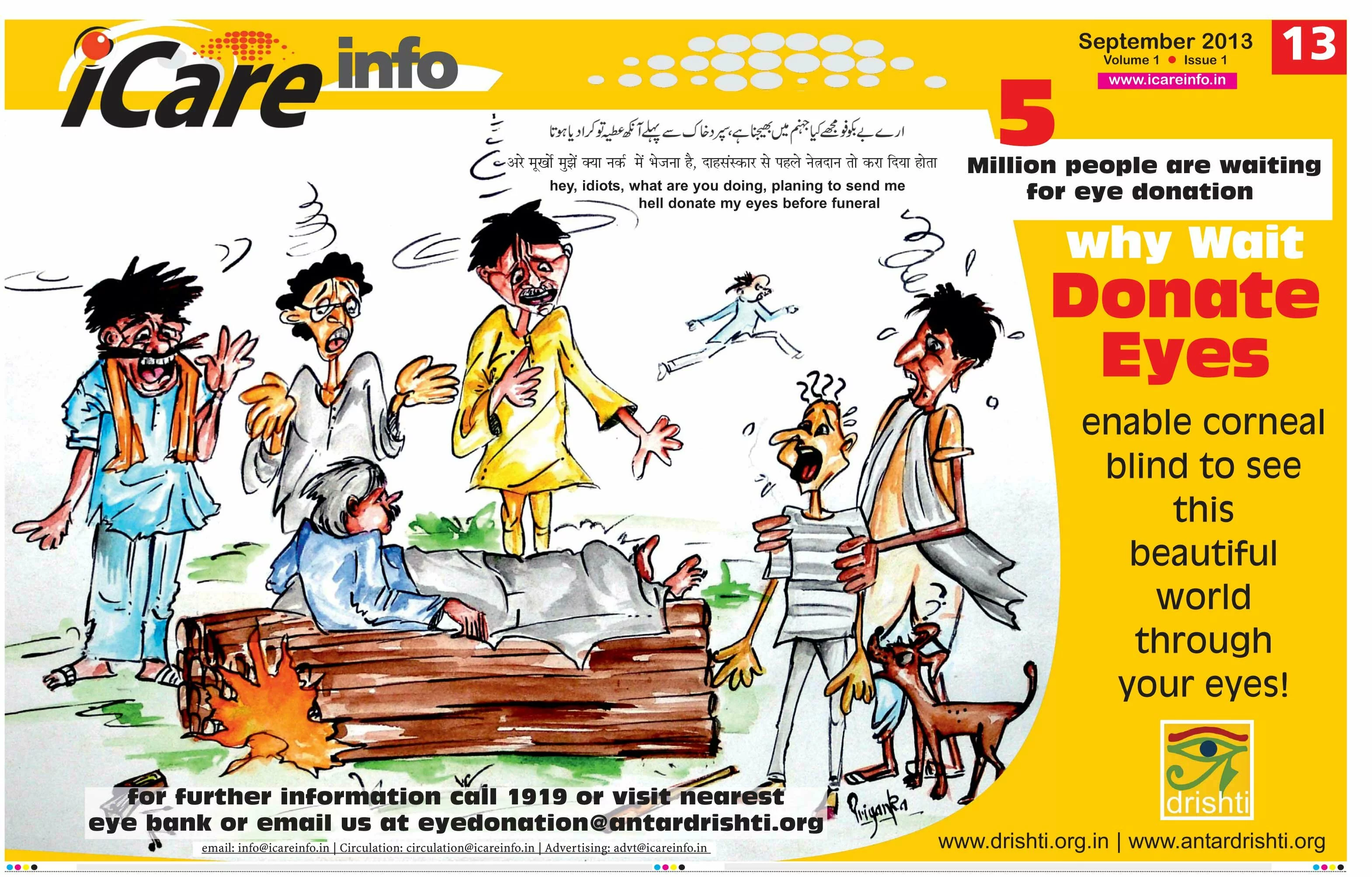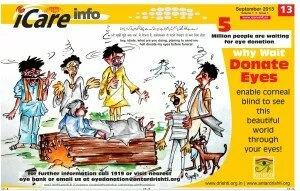Eye Donation – F.A.Q.

 1. What is Eye Donation?
1. What is Eye Donation?
Eye donation is an act of donating one’s eyes after his/her death. Only corneal blinds can be benefitted through this process not other Blinds. It is an act of charity, purely for the benefit of the society and is totally voluntary. It is done after death. The eye donation of the deceased can be authorized by the next of kith & kin even if the deceased did not pledge to donate his / her eyes before death.
2. What is the use of eyes received?
The eyes, which are received through such magnanimous gestures, are of great benefit to the society. The front, clear and transparent tissue of the eye called as cornea can be used to restore vision to corneal blind person. The other portions of the eye are also used for research and training purposes to develop cures for some of the common eye diseases.
3. What is Corneal Blindness?
The Cornea is the clear tissue covering the front of the eye. It is a focusing element of the eye.It The Vision is dramatically reduced or lost if the cornea becomes cloudy. This loss of the vision is referred as corneal blindness.
4. What causes corneal blindness?
The cornea can get damaged through accidents. Children, while playing with sharp objects (e.g. bows and arrows, pen, pencil, etc.) can accidentally damage their cornea. Corneal blindness can also happen to elders. Some of the industrial causes are chemical bums, flying debris or road accidents. The cornea can get damaged due to infections and malnutrition as well.
5. Is there a cure for corneal blindness?
Yes. Removing the damaged cornea and replacing it with a healthy cornea by surgery can cure corneal blindness. Till date the treatment of the corneally blind people is corneal grafting. Artificial corneas have not yet been developed and hence the only source for cornea is from our fellow human beings.The first corneal transplant took place in 1905.
6. What is the source for the cornea?
Fortunately, cornea can be removed from a deceased person within six hours of death and can be used for surgery. Artificial cornea has not yet been developed nor is there any other objective. The eyes, which would ultimately be consigned to flames, or buried along with the body, can restore sight to two or moer needy people.
7. What is the magnitude of corneal blindness?
In India,There are 4.9 million people suffering from corneal blindness. Out of 4.9 million people at least 3 million can benefit from Corneal Transplantation.Majority of the 4.9 million are young adults ( below 45 years)who have to spend long blind years even though they have a cure. Cumulative loss of Gross National Product consequen to this is estimated to be 11.1 billion dollars, while the problem is formidable. The need to take up the challenge of cutailing it is compelling. The present collection from all over the COUNTRY is 41883 !! (Year-2011 (source EBAI.)India has largest burden of Global Blindness.
8. How can one donate eyes?
Eyes are removed only after death. A person wishing to donate eyes should make close family members aware of their intentions. After the death of the person, it is the family who can inform the nearest eye bank to fulfill the wishes of the deceased or authorize the removal of the eyes if somebody from an eye bank approaches the family.
9. What is an Eye Bank?
An Eye Bank is a charitable organization and is not for profit .They are purely functioning for the benefit of the society. The eye banks facilitate removal of eyes, processing of eyes and evaluation of the eyes and distribute them to the needy. The first Eye Bank was set up in United states in 1945 at Newark City. Around 500 + – Eye banks in India.
10. How do I ensure that the eyes so donated would not be misused?
Eye Banks are covered under “Transplantation of Human Organs Act” since 1994. It is a criminal offence to buy or sell organs. The Government issues a certificate of registration to eye banks and has a provision to inspect them regularly. In case a complaint is filed against any eye bank, the Government can take legal action.
11. How do I contact an eye bank?
A special Toll free number 1919 (BSNL) Nationwide has been allotted for eye banks. Most of the eye banks all over the country have this number, once information for eye donation is communicated to eye banks; the eye bank sends its team to collect the eyes. By calling this number, details about eye donation can also be obtained also,all local news paper carry the eye banks number in their Emergency Number list.You can even get it from 197(BSNL/TATA Directory numbers.)At last,If required,you can contact any hospital and ask them for thelocal eye bank number.
12. What is the procedure for eye donation?
The local telephone directory usually lists the phone number of eye banks under essential services. The eye bank personnel would give directions and precautions to be taken. The process of removing eyes does not take more than 15 to 20 minutes. The eye bank team can come either to the house where death has taken place or to the hospital where death has taken place to remove the eyes there. It would not delay the funeral arrangements.
13. What precautions are to be taken?
Switch off fans and switch on Air conditioner (if available). Raise the head of the deceased slightly by placing a pillow underneath. Place wet clean cloth over the closed eye lids. Please ensure that the eyelids are properly closed. Keep a copy of the death certificate ready (if available). Contact the nearest eye bank as quickly as possible.Give the correct address with specific landmarks or famous name of our area and mobile and residence number to enable the team of eye bank for locating the house easily.Give alternate cell number of any available relatives also.The eye bank team, which would have a trained technician and/or a registered medical practitioner, would remove the eyes after taking consent on a printed form in the presence of two witnesses and also take A small quantity of blood sample will be drawn to rule out communicable diseases.
14. After the removal of eyes, would there be any complications or disfigurement?
There are two methods adopted for removal of eyes. Some eye banks would remove the whole eyeball. In such a case there may be temporary bleeding. The team is well trained to take care of such eventualities. There would be no disfigurement. The eye bank team, after the removal of eyes would properly close the eyes so that there is no disfigurement. The second method is the removal of only the clear transparent tissue. Here also a plastic shield is placed in place of the tissue and no difference can be noticed.
15. Is eye donation against religious principles or traditions?
All religions endorse eye donation. There are numerous examples in our traditions and scriptures, which endorse eye and organ donation. A part of the body would be consumed by flames and reduced to ashes or which is buried and allowed to decay and disintegrate & cannot be put to a better use than restoring vision to the needy!!!
16. Who can donate eyes? Is there any age limit?
Any person of any age can donate eyes. Even if the deceased has medical history of hypertension, diabetes, asthma, tuberculosis etc., and even spectacle wearers and people who have undergone cataract operation can donate eyes.
17. Who cannot donate theireyes?
Patients suffering from Rabies, Tetanus, Aids, Jaundice, Cancer, Gangrene, Brain Tumor, Food Poisoning, Septicaemia& a person who has died due to drowning etc. cannot donate their eyes.
18. How can you help?
Dial the the eye bank after the unfortunate death of your near and dear one soon after the death. Give consent to donate the eyes of you near and dear one. Motivate the family members of anyone who has died in your area and spread information about eye donation. Be a partner in this noble cause.
